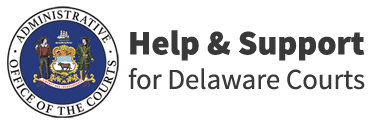Non-Jury Trial in the Court of Common Pleas
What Happens at a Non-Jury Trial?
Because the State of Delaware has the burden of proof, it goes first. The chief law enforcement officer of the State is the Attorney General, and that office prosecutes all criminal and motor vehicle proceedings. The Attorney General appoints lawyers to represent the Department of Justice in prosecuting these cases, and these lawyers are known as Deputy Attorneys General. All prosecutions are brought on behalf of the State, and the individual charged with motor vehicle offense(s) or criminal charge(s) is the defendant.
At a non-jury trial, the Judge decides questions of fact and questions of law.
Stages of a Non-Jury Trial
Opening Statements
The Deputy Attorney General, on behalf of the State, may make an opening statement to the Court summarizing the evidence it is going to present, but generally does not as the trials tend to move quickly. The defendant may likewise make an opening statement summarizing the evidence he/she plans to present. The defendant may wait to make its opening statement until after the prosecution has completed presenting its case-in-chief.
Presenting Witnesses
The State begins presenting evidence by calling witnesses. Each witness is sworn to tell the truth and testify from the witness stand. The Deputy Attorney General begins by asking questions (direct examination,) and the defendant may then ask questions of the witness (cross-examination.) The State may ask further questions of the same witness after cross-examination to clarify matters (redirect examination.) The defendant may also ask questions to clarify matters (recross-examination.) The judge may also ask questions of the witness.
After the last witness for the State has testified, the Deputy Attorney General will inform the Court that the prosecution has rested its case-in-chief. The defendant is then entitled to present evidence, but is not required to do so.
If the defendant chooses to present evidence, the defendant may make its opening statement, if it did not do so after the prosecution's opening statement. The defendant may begin calling witnesses. As with the State witnesses, each witness is sworn to tell the truth and takes a seat in the witness stand. The defendant asks questions of the witness (direct examination.) The State may then ask questions of the witness (cross-examination,) followed by redirect and recross-examination, if needed.
The defendant is entitled to testify as a witness if he/she chooses to do so. Since the defendant has a right to remain silent, the defendant cannot be forced to testify. If the defendant chooses to testify, the defendant has waived the right to remain silent, and the prosecution may cross-examine the defendant.
After the defendant has presented all of his/her witnesses, the defendant rests. The State may then call rebuttal witnesses. Rebuttal witnesses are witnesses called to oppose or refute evidence presented by defense witnesses. Rebuttal witnesses are questioned in the same manner as other State witnesses.
Closing Arguments
After all witnesses for the State and the defendant have testified, the Court then will hear closing arguments. The State begins its closing argument by reviewing the evidence and describing how the evidence proves its case. The defendant may then present its closing argument by reviewing the evidence and describing how it fails to prove the prosecution's case. After the defendant makes his/her closing argument, the prosecution is permitted to make a final closing argument if it chooses.
Verdict
After closing arguments, the Judge decides if the defendant is guilty or not guilty of the charge(s). If the Judge needs more time to think about the matter or the legal issues surrounding the case, he/she may reserve decision in the matter and issues a written opinion or decision at a later date.

